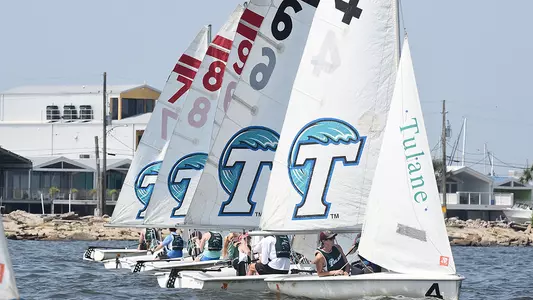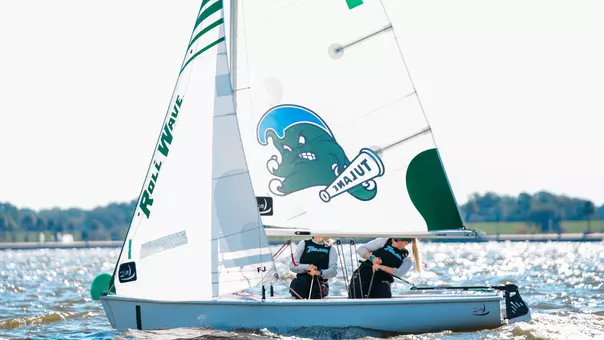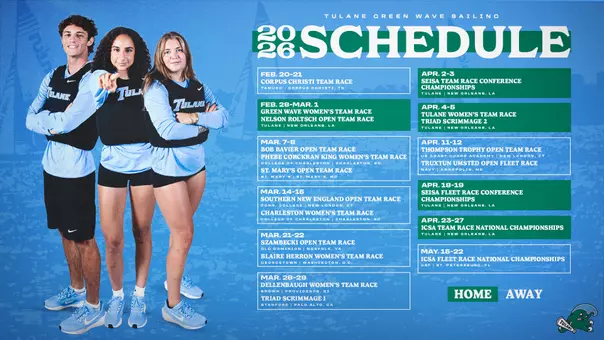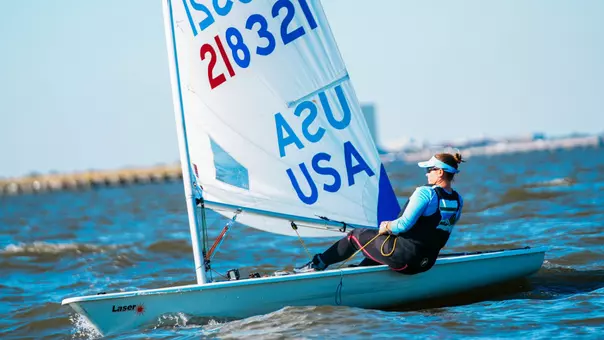
Photo by: Parker Waters
Sailing 101: College Sailing Structure, How to Win Championships
Jul 19, 2018 | Sailing
Welcome to Sailing 101! Class is now in session! This is the third of a three-part series intended to educate Tulane fans on the basics of sailing, our newest varsity sport.
Each story in the three-part series will focus on a different aspect of sailing: 1) the boats and sailors; 2) the regattas; 3) the national structure of collegiate sailing and how to win a championship. Part one was released July 5 and part two came out July 12.
Part 1: Boats/Sailors | Part 2: Regattas/Races | Part 3: College Sailing Structure
NEW ORLEANS – Sailing 101 has taken you through the process of how to sail a boat and shown you what takes place at college sailing regattas. Now for one final lesson: How is college sailing divided nationally? What does it take to win a conference championship? How about a national championship?
Before we work our way up to a national championship, let's start on a more local level.
THE CONFERENCES
Sailing does not compete for an NCAA championship – the organization does not yet sponsor sailing – and schools competing in sailing at the club or varsity level span a wide range of classifications in other sports. Tulane will be racing against schools who represent NCAA Division I, II and III level as well as schools who are NAIA in other sports.
Because of this, there are no traditional conferences that you might be familiar with. No Big Ten, no SEC, and no American Athletic Conference affiliation for sailing.
Instead, college sailing is organized by the ICSA, or the Intercollegiate Sailing Association. The ICSA – made up of 266 schools – is divided into seven conferences based purely on geography. Tulane will compete in the SEISA Conference, or the South East Interscholastic Sailing Association, and will be the only varsity program in the league at an NCAA Division I school. Colleges located in Louisiana, Texas, Kansas, Oklahoma, Alabama and parts of Colorado and Florida are in SEISA. Teams cannot join conferences in other parts of the country.
College sailing conferences are also not balanced in any way by numbers. SEISA has 21 members and is the second-smallest conference in the ICSA. The NEISA, or New England conference, has 58 members. Here are the seven conferences in the ICSA, their region and their membership numbers:
CONFERENCE AND NATIONAL CHAMPIONSHIPS
Each of the seven leagues contests conference championships throughout the year in college sailing's six disciplines:
The SEISA is no exception to this. Tulane will be competing for SEISA championships in men's and women's singlehanded racing on September 15-16 in Galveston, Texas, beginning the year with a huge regatta right off the bat. The SEISA Match Race Championship will also be held in the fall on October 27-28 at a site to be determined.
The team racing, women's and co-ed conference championships will be held in the spring season.
Like their conference championships, the national championship in all six disciplines will be held during the same season. Tulane could contest for national championships in singlehanded and match racing in the fall and the other three disciplines in the spring.
So how does Tulane qualify for a national championship? It will likely take winning a conference championship.
Spots in each national championship are determined by conference size. Larger conferences like MAISA and NEISA get more spots in national championships. SEISA, meanwhile, might only get one spot with that spot awarded to the conference champion.
Each discipline takes a different number of teams to the national championship. Team racing has 16 teams, match racing only has 10 while women's and men's singlehanded fleet racing have 18. Additionally, women's and coed fleet racing had a national semifinal round for which Tulane's club team qualified last year. The national semifinals take the top 36 teams in the country and narrow it down to 18 for the national championship regatta which is held at the same location later in the week.
THE BIG ONE
Now you know that college sailing contests six national championships. Is any one of them the "true" national championship?
The answer is "not really." The three spring championships are traditionally seen as the bigger races and are looked at evenly. The three fall championships are seen more as specialty disciplines.
However, there is one award that aims to unify all of the championships: The Leonard M. Fowle Trophy.
In the Fowle Trophy system, schools are given points based on their performance at the national championships. So, for example, winning the women's or men's singlehanded national championship would net a school 13 points. The second-place school gets 12.87 points. Each national championship awards points on a different scale. But at the end of the year, adding up points across all six disciplines determines the Fowle Trophy winner.
This year, the College of Charleston won the Fowle Trophy with 98.53 combined points, beating out Boston College by less than one point.
Tulane actually has history in college sailing and won the Fowle Trophy in 1974 to be crowned the best team in college sailing.
With the Green Wave now a varsity program, another Fowle Trophy would be the team's ultimate goal. And now you know how they can win it. The season starts September 15. See you on the water.
Thank you for joining us for our Sailing 101 series. Class dismissed.
Each story in the three-part series will focus on a different aspect of sailing: 1) the boats and sailors; 2) the regattas; 3) the national structure of collegiate sailing and how to win a championship. Part one was released July 5 and part two came out July 12.
Part 1: Boats/Sailors | Part 2: Regattas/Races | Part 3: College Sailing Structure
NEW ORLEANS – Sailing 101 has taken you through the process of how to sail a boat and shown you what takes place at college sailing regattas. Now for one final lesson: How is college sailing divided nationally? What does it take to win a conference championship? How about a national championship?
Before we work our way up to a national championship, let's start on a more local level.
THE CONFERENCES
Sailing does not compete for an NCAA championship – the organization does not yet sponsor sailing – and schools competing in sailing at the club or varsity level span a wide range of classifications in other sports. Tulane will be racing against schools who represent NCAA Division I, II and III level as well as schools who are NAIA in other sports.
Because of this, there are no traditional conferences that you might be familiar with. No Big Ten, no SEC, and no American Athletic Conference affiliation for sailing.
Instead, college sailing is organized by the ICSA, or the Intercollegiate Sailing Association. The ICSA – made up of 266 schools – is divided into seven conferences based purely on geography. Tulane will compete in the SEISA Conference, or the South East Interscholastic Sailing Association, and will be the only varsity program in the league at an NCAA Division I school. Colleges located in Louisiana, Texas, Kansas, Oklahoma, Alabama and parts of Colorado and Florida are in SEISA. Teams cannot join conferences in other parts of the country.
College sailing conferences are also not balanced in any way by numbers. SEISA has 21 members and is the second-smallest conference in the ICSA. The NEISA, or New England conference, has 58 members. Here are the seven conferences in the ICSA, their region and their membership numbers:
- MAISA: Mid-Atlantic and Ontario, 57 members
- MCSA: Midwest, 44 members
- NEISA: New England and Quebec, 58 members
- NWICSA: Pacific Northwest and British Columbia, 11 members
- PCCSC: Pacific Coast, 40 members
- SAISA: South Atlantic, 35 members
- SEISA: Southeast, 21 members
CONFERENCE AND NATIONAL CHAMPIONSHIPS
Each of the seven leagues contests conference championships throughout the year in college sailing's six disciplines:
- Men's singlehanded racing (fleet race format)
- Women's singlehanded racing (fleet race format)
- Match racing
- Team racing
- Women's fleet racing
- Coed fleet racing
The SEISA is no exception to this. Tulane will be competing for SEISA championships in men's and women's singlehanded racing on September 15-16 in Galveston, Texas, beginning the year with a huge regatta right off the bat. The SEISA Match Race Championship will also be held in the fall on October 27-28 at a site to be determined.
The team racing, women's and co-ed conference championships will be held in the spring season.
Like their conference championships, the national championship in all six disciplines will be held during the same season. Tulane could contest for national championships in singlehanded and match racing in the fall and the other three disciplines in the spring.
So how does Tulane qualify for a national championship? It will likely take winning a conference championship.
Spots in each national championship are determined by conference size. Larger conferences like MAISA and NEISA get more spots in national championships. SEISA, meanwhile, might only get one spot with that spot awarded to the conference champion.
Each discipline takes a different number of teams to the national championship. Team racing has 16 teams, match racing only has 10 while women's and men's singlehanded fleet racing have 18. Additionally, women's and coed fleet racing had a national semifinal round for which Tulane's club team qualified last year. The national semifinals take the top 36 teams in the country and narrow it down to 18 for the national championship regatta which is held at the same location later in the week.
THE BIG ONE
Now you know that college sailing contests six national championships. Is any one of them the "true" national championship?
The answer is "not really." The three spring championships are traditionally seen as the bigger races and are looked at evenly. The three fall championships are seen more as specialty disciplines.
However, there is one award that aims to unify all of the championships: The Leonard M. Fowle Trophy.
In the Fowle Trophy system, schools are given points based on their performance at the national championships. So, for example, winning the women's or men's singlehanded national championship would net a school 13 points. The second-place school gets 12.87 points. Each national championship awards points on a different scale. But at the end of the year, adding up points across all six disciplines determines the Fowle Trophy winner.
This year, the College of Charleston won the Fowle Trophy with 98.53 combined points, beating out Boston College by less than one point.
Tulane actually has history in college sailing and won the Fowle Trophy in 1974 to be crowned the best team in college sailing.
With the Green Wave now a varsity program, another Fowle Trophy would be the team's ultimate goal. And now you know how they can win it. The season starts September 15. See you on the water.
Thank you for joining us for our Sailing 101 series. Class dismissed.
Tulane Athletics - Tulane sailing to benefit from $2.75 million gift
Friday, October 27
Coach Higgins Sailing Look In
Friday, November 18
2020 Tulane Sailing Season Highlights
Thursday, March 26
Sailing Earns No. 1 and 2 Finishes in Baldwin Wood Regatta
Sunday, October 28















